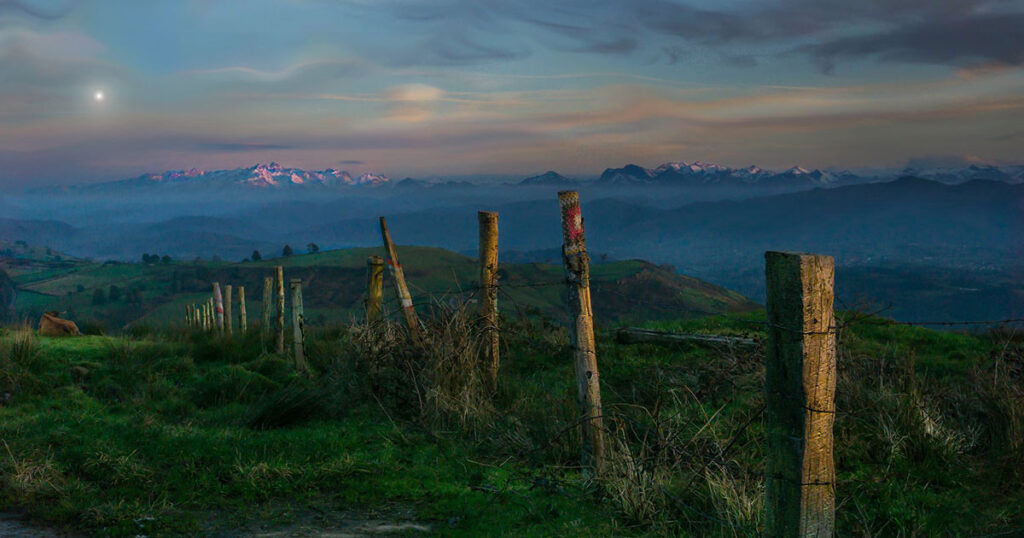
Between the setting of the sun on All Saints’ Day and the sun’s rising on All Souls’ Day, the wind in Pola de Siero blew and blew and blew. It was tremendous. There hasn’t been another such wind like it since. It whisked all the stacked plastic pots off the metal shelves in the back corridor of my patio and yanked them around the corner, then with a new blast sent them flying. On my covered balcony, it seized a handful of clothing hung out to dry. In the lane, it raced up and down, pausing to rattle windows and doors. Then on it went, only to return looking for more trouble. I went to sleep during a lull and awoke around three a.m. to ongoing commotion. I lay there wondering how bad the wind was, how bad it could get, and how someone like me, who doesn’t watch the TV news, listen to the radio, or keep up with social media, could be forewarned. All I have is the ongoing crescendo.
In the morning, before dawn, I made coffee. Then, as I took my first sip, the electricity went out. My first cup of coffee tastes just as good in the dark while listening to the wind, I learned, as it does under the glow of a reading lamp. The problem was, my second cup wouldn’t without electricity to keep it hot. I’d need electricity to brew a substitute cup of tea. Without the power, no way of grilling a sandwich. Heating some soup. Making rice. Soon the sun arrived, the electricity came back on, and I heated my second cup and drank it at the window, surveying the neighbors’ broken plants and pots, tossed from the windowsill and swept off the outside table. Mine, all of them against a wall, had fared better. But across the way, I spied one sock and a pair of underwear from my line, which I retrieved just as my neighbors were arriving. The wife opened the gate into the farmyard and the husband drove in. “What a wind!” I commented to her.
“Look,” she said, pointing at the plants beside the table. Her face was stern, as if she’d caught a culprit rather than noticed an unavoidable accident. She shook her head, still gazing at the shattered pots. “This can be fixed,” she said, waving her hand toward the mess before turning to me. She explained that she and her husband had not known what they would find on arriving this morning. They’d feared the tin roof of the large open barn would have blown off—but no, there it was—or great destruction in the field where they keep the cows, stakes blown out of the ground, branches tossed across the fence, trees down, the cows escaped. “Oh dear!” I commiserated, thinking of their hours of worry before first light. “Was everything okay?”
She didn’t know. Here everything was okay, but they hadn’t been out to where the cows were yet. Now, while she fed the dog and cleaned up here, her husband was going to check on the cows. She shut the gate behind him. The big old dog lumbered to his feet. She turned again to me where I stood, my undergarments clutched in my hand, and said that she couldn’t go with him because of her shoes.
She was in her courtyard and I in the lane. The wood gate stood between us. I leaned over to peer at her shoes. Usually she wore rubber boots up to her knees. Not that day. I noticed now how lightly she was clad, just trousers, a shirt with cuffs and collar visible under a blue sweater, and her sensible, sturdy brown leather shoes. Those shoes! Not masculine or dressy or sporty or feminine or work or leisure, polished but not gleaming—what fine, ordinary everyday shoes! And it took a windstorm for her to put them on and me to look at them!
I would find out the next day that the cows were fine, and no fences had blown away, no sheds turned into tinder. At the time, though, she didn’t know that, and her worry might have accounted for her gruff manner with the dog and the staff she brandished when he shuffled to her. Then she said to me, as if about to divulge a great truth, “I’ll tell you something.” She lowered her voice, but her tone was emphatic. Her short white hair, thick and straight, lifted in a ripple of wind. Her voice was almost fierce. She leaned closer. “I would rather have it rain than have this wind.” She waited a beat, as if to let the words sink in. “Yes, I would!” Then she added something—a bit of counsel or a prediction? Only the wind heard her. It took her words and gobbled them up.

